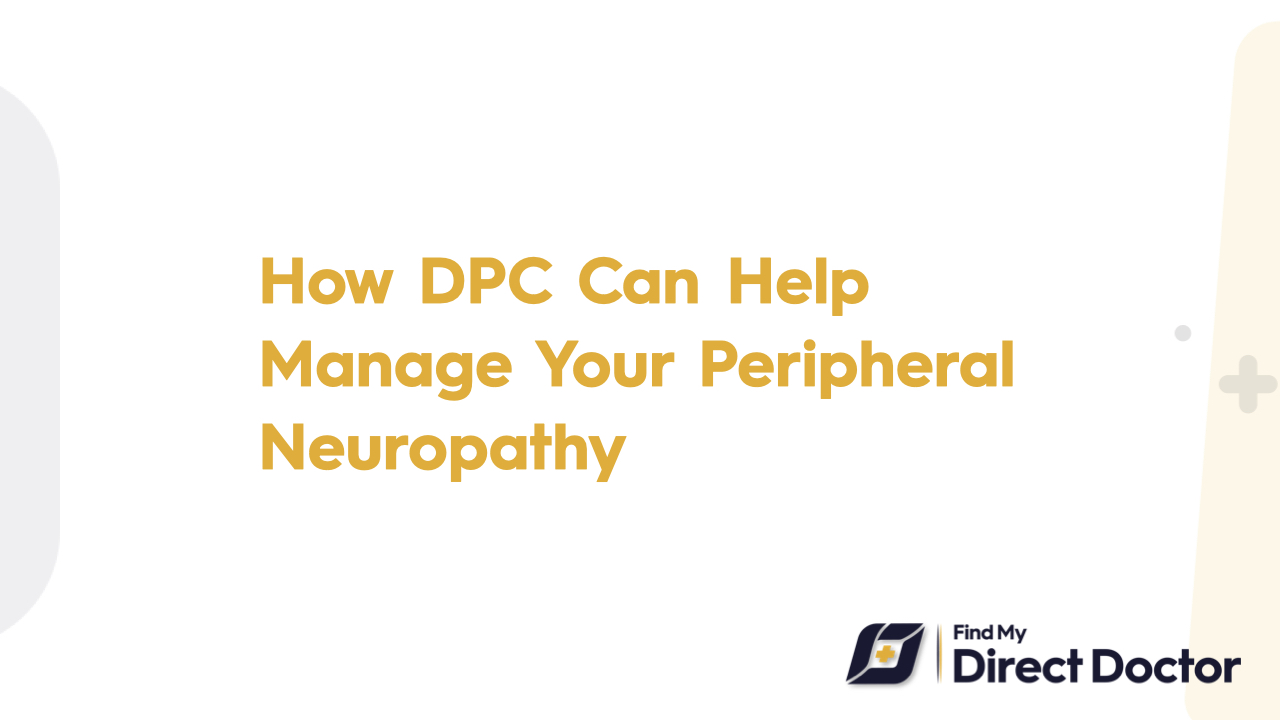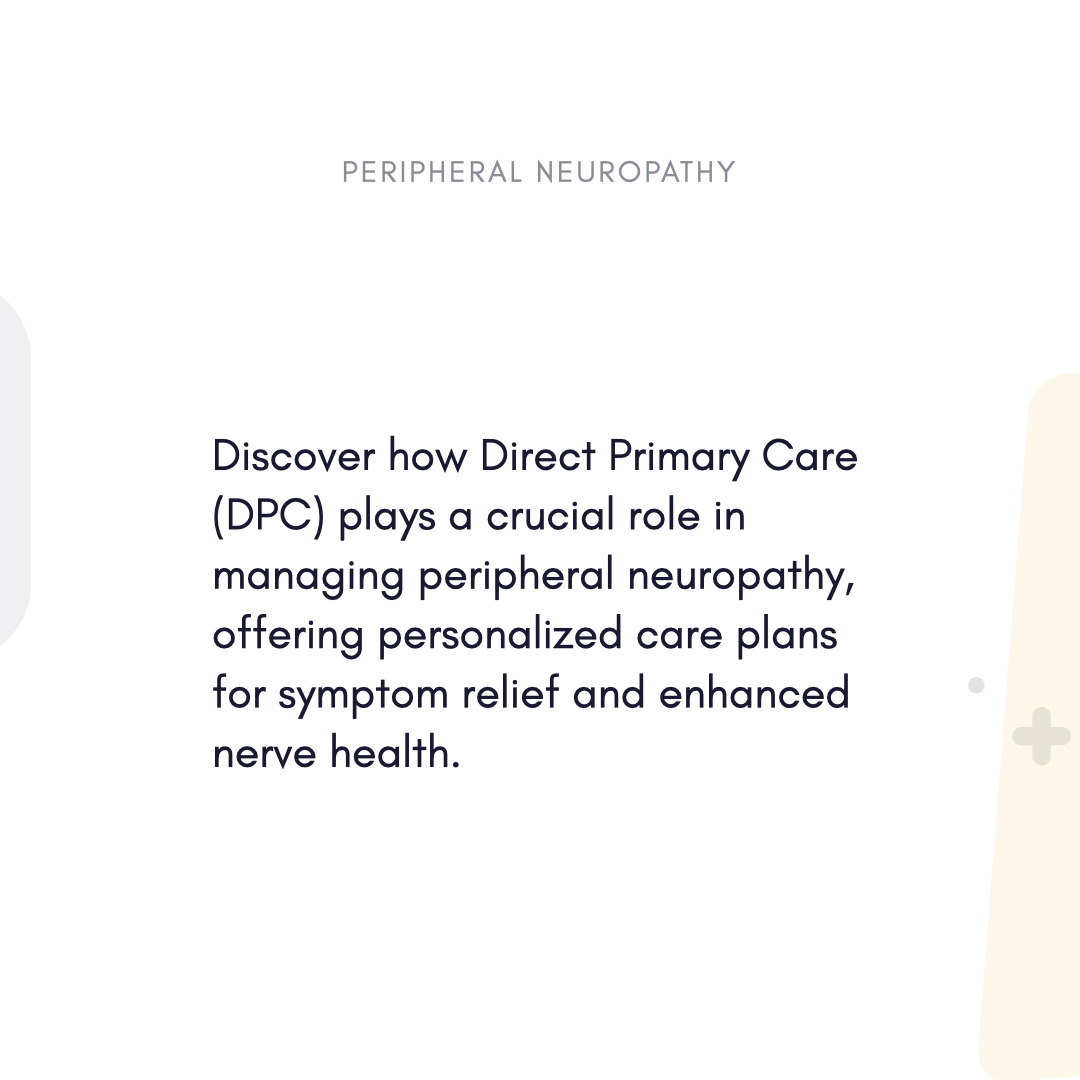Peripheral Neuropathy and Direct Primary Care (DPC): Personalized Care for Pain Relief and Nerve Health
An unrelenting burning in your feet. Numbness that renders every stride a gamble. For 20 million Americans suffering with peripheral neuropathy, this nerve damage goes beyond mere pain; it also increases their risk of falls, infections, and stolen freedom. Although traditional treatment often prescribes pills without probing causes, there is hope: direct primary care (DPC) offers a proactive partnership to quiet symptoms and address underlying problems.

Knowing Peripheral Neuropathy
Affecting nerves outside the brain/spinal cord, peripheral neuropathy causes:
- Often in hands or feet, burning, tingling, or electric shock-like pain
- Numbness or weakness increasing fall hazards
- Autonomic symptoms: Blood pressure decreases, problems with digestion
Standard causes:
- Diabetes, with 60–70% of cases:
- Chemotherapy, drinking alcohol, vitamin shortages
- Autoimmune diseases (lupus, CIDP)
The American Academy of Neurology stresses the need of spotting and fixing fundamental causes to stop advancement.
How DPC Changes Neuropathy Treatments
Operating on a membership model usually 50–150 USD/month, Direct Primary Care (DPC) provides unlimited access to your physician for a fixed fee. This translates for neuropathy patients into no co-pays, no insurance delays, and a care plan as exact as your nerve paths.
1. Research on Root Cause:
The accessible model of DPC allows same-day assessments for balance problems or sudden numbness.
- Affordable testing includes HbA1c, B12/folate levels at wholesale rates and nerve conduction studies.
- Starting IVIG for autoimmune cases or alpha-lipoic acid for diabetic neuropathy, immediate interventions
2. Customized, Multimodal Treatment
DPC doctors design customized programs compliant with neurology recommendations:
- For pain relief, mediate with topical capsaicin, duloxetine, or gabapentin.
- Blood sugar control, alcohol avoidance, and balance training are among lifestyle choices.
- Advanced treatments include TENS units or plasma exchange coordinated with neurologists.
3. All-Encompassing, Reasonably Priced Assistance
DPC lowers emotional and financial burden by cutting drug prices:
- For compounded creams or pregabalin, wholesale pricing.
- 24/7 telehealth access allows one to control medication side effects or pain flare at home.
- Exams for diabetic foot help to prevent ulcers and amputes.
DPC Benefits for Neuropathy Patients
1. Unequal Accessibility
- 24/7 text/phone provider access for urgent issues including falls or new weakness.
- Not waiting for EMG/NCS testing or neurologist referrals.
2. Precision Care:
- Immunotherapy for autoimmune conditions, B12 injections for a deficiency.
- Pain management: substitutes for opioids (such CBD or referrals for acupuncture).
3. Open and Reasonable Cost
- Membership consists in consultations, nerve tests, and care coordination—not in hidden costs.
- Typical savings: 1,200+ USD yearly by skipping imaging mark-ups, specialist co-pays, and ER visits.
Personal Success Stories from Real Life
- Case 1: Constant foot pain beset 58-year-old Sarah with diabetic neuropathy. Her DPC doctor arranged cash-pay physical therapy, prescribed alpha-lipoic acid, and optimized her insulin schedule. She stays away from amputation and walks pain-free today.
- James, 65, battled balance since he had chemo-induced neuropathy. His DPC provider advised aquatic therapy, wrote home safety tips, and prescribed gabapentin. His fall risk dropped eighty percent.
FAQs on DPC and Peripheral Neuropathy
- Can DPC manage complicated conditions like amyloidosis or CIDP?
- A: Surely. Often at self-pay discounts, DPC doctors arrange with neurologists for IVIG, immunosuppressants, or genetic testing.
- For patients with uninsured neuropathy, is DPC within budget?
- A: Surely. Through proactive treatment, members avoid 5,000+ USD ER bills, save 50–70% on drugs and nerve studies.
- Q: Suppose I need a podiatrist or another specialist?
- A: DPC doctor arranges same-week visits and cash-pay rates for orthotics in collaboration with wound care specialists.
Why DPC Benefits Patients With Neuropathy
Emphasizing DPC's alignment with neurology guidelines, the American Academy of Family Physicians supports DPC.
- Treating diabetes, deficiencies, or toxins—not only symptoms—requires root cause attention.
- Tools for tracking blood sugar, pain triggers, and mobility goals help empower you.
- Trust: Replacing scattered, impersonal visits is a consistent care team.
Recover Your Nerve Health Without Waiting
One does not have to give up to suffering with peripheral neuropathy. DPC helps you to find a partner who listens carefully, acts quickly, and prepares you to boldly move toward healing.






